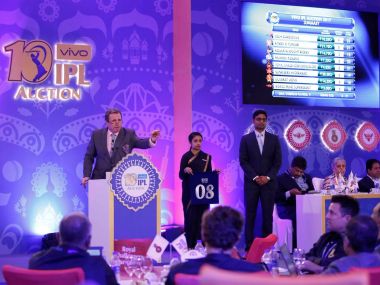This is guesswork, but it’s unlikely former US Defense Secretary, Donald Rumsfeld, took much interest in the Indian Premier League (IPL) auction. Although you might term him and ex-Veep Dick Cheney the Lillee and Thomson of hawkish interventionism, his thoughts on Gujarat Lions’ spending plans remain undocumented. His snazzy phrase about “known unknowns”, however, relating to things we know exist but cannot understand always seems apt in relation to the strategies of IPL franchise owners.
This wasn’t a vintage year for leftfield extravagance. There was no million-dollar Chris Morris moment, but there was financially still some “complete carnage”, a term used by the most expensive purchase, Ben Stokes, who was picked up by Rising Pune Supergiants for Rs 14.5 crore. He may have settled for considerably less had his franchise promised to spend the difference on Carlos Brathwaite, but, alas for the England all-rounder, his six-clumping nemesis was retained by Delhi Daredevils. Revenge for the World T20 final will be in the air, or at least the previews, when the two sides meet on 11 April.
The very nature of the auction itself can be anything from lucrative to humiliating for cricketers. England’s slower-ball-on-a-string pace trickster Tymal Mills was sat having his breakfast with Luke Wright when the news came through he’d been snapped up by Royal Challengers Bangalore for Rs 12 Crore. He’s “just got a hell of a lot better looking”, quipped his Sussex teammate on Twitter . At the same time, other players were having their and their accountants’ dreams punctured by being overlooked for a variety of reasons. As with most years, some were understandable. As with every year, some were inexplicable.
Falling into the latter category was certainly the decision of all franchises to ignore Imran Tahir. Why on earth would the world’s premier T20 league not want to have the world’s best short format bowler participating in it? Perhaps franchises felt his celebrations were too low-key and understated for the razzmatazz of the IPL? Perhaps his modest but by no means poor efforts during his previous stints in the event played against him? Perhaps, the cynical might suggest, his decision to recently wear a T-shirt in honour of deceased “Dil Dil Pakistan” singer and writer Junaid Jamshed was a factor?
The IPL is a hotbed of financial, commercial and political pressures as well as sporting ones and it is against this backdrop that Pakistan players continue to play no part in the tournament. There is no overt ban, but it is understood by all involved that any Pakistan player put up for auction will not be bought. A tribute from Tahir, born in Lahore, for a pop idol so indelibly linked with Pakistan cricket may have been a bit too much for the franchises. But, of course, nobody really knows why he went unsold.
It is also speculative how things might work the other way if Indian players wanted to participate in the Pakistan Super League (PSL). Both PCB chief Najam Sethi and influential ex-cational captain Javed Miandad have both made welcoming noises about the idea, but whether or not a PSL franchise would actually buy an Indian player is up for debate. The question is irrelevant at present, though, as the BCCI retains a ban on any of its players playing in overseas T20 tournaments. Despite the new wave of leaders ushered in by the Supreme Court recently, this particular policy seems to remain in place.
Just this month World Cup and World T20 winner, Yusuf Pathan, was refused permission to play for Kowloon Cantons in Hong Kong’s upcoming T20 Blitz. Regarding premier tournaments such as Australia’s Big Bash League, you can possibly understand if not condone the BCCI wanting to protect the IPL’s competitive advantage by barring its players from participating. But the decision not to allow Pathan, 34, to play in a relatively minor event just seemed slightly petty, especially after he had initially been told he could.
The refusal also raised another issue about players who wish to play abroad, and especially those of advancing years who fancy a nice franchise pay day to top up the retirement fund. As seen with South African players taking up Kolpak contracts in England, the BCCI may soon find a situation where the loss of an international or even domestic career is no longer a big enough deterrent to grabbing a lucrative contract overseas. And if the PSL does grow ever more lucrative, who’s to say a few Indian players’ heads may not be turned in that direction?
But this is a future issue. In any case, the PSL has more pressing problems than luring Indians to its franchises, and not least one which raises questions of money, security and loyalty in a global T20 world. Although the tournament has thrown up some excellent matches, its end is threatening to overshadow all else, with some controversy over where the final should take place: In the UAE where all the preceding matches have been played, or in Pakistan itself?
This week the PCB reaffirmed it would be holding the match in Lahore, scene of not only the horrific terror attack on the Sri Lankan team in 2009, but also a similarly bloody and tragic attack just last week. There have been plenty in between as well, but with Pakistan fans starved of international cricket since the first incident — bar five limited overs matches versus Zimbabwe in 2015 — the PCB is understandably eager to have a gala final held on home soil. An unlikely champion of such a decision has emerged in the form of ex-ECB chairman, Giles Clarke, who has been visiting the country to make an assessment of just how safe it is for international cricketers to tour there.
Clarke believes having the final in Lahore will be a defiance of terrorism, and it is true that, regardless of any risk, the PSL final will undoubtedly be a sell-out event with an incredible atmosphere. But it presents a terrible dilemma for the players of those sides who make it there. They have been promised state-level security, but in a country with such a terrorist threat it is no easy decision. The focus is inevitably (but not completely understandably) on the overseas players in the PSL, and reports suggest opinion is divided.
Kumar Sangakkara and Mahela Jayawardene, both on the bus that fateful day eight years ago, have understandably ruled themselves out. Kevin Pietersen, playing for Quetta Gladiators, has said he will make his decision only if and when his team makes the final. As with the recent decision of Eoin Morgan (also playing in the PSL) and Alex Hales to miss England’s tour of Bangladesh, any choice the players’ make will be scrutinised relentlessly.
People will hopefully empathise with the players’ fears as well as pointing to their generous pay packets before passing judgment on any who decide not to travel to Lahore. But if the PSL continues to grow, an increase in money for players may also coincide with the PCB wanting to stage more games in Pakistan in future years. With greater salaries will come a greater pressure to play in Karachi, Lahore and Islamabad. It may produce a vicious dilemma for players, and possibly a legal one too if PSL franchises seek to impose contractual obligations to play in Pakistan.
When T20 was invented, it was regarded in many quarters as a little bit of fun, just a bit of a giggle. It has become far more than that. Its on-field aggression and strategies have influenced every other format. Off the field, the money involved in its franchise tournaments is threatening to change norms, whether it be Indian and Pakistan players playing together or international players not taking to the field in Pakistan. The existing impact of T20 is known. Where it will take cricket in future is pretty much unknowable.


)




)
)
)
)
)
)
)
)